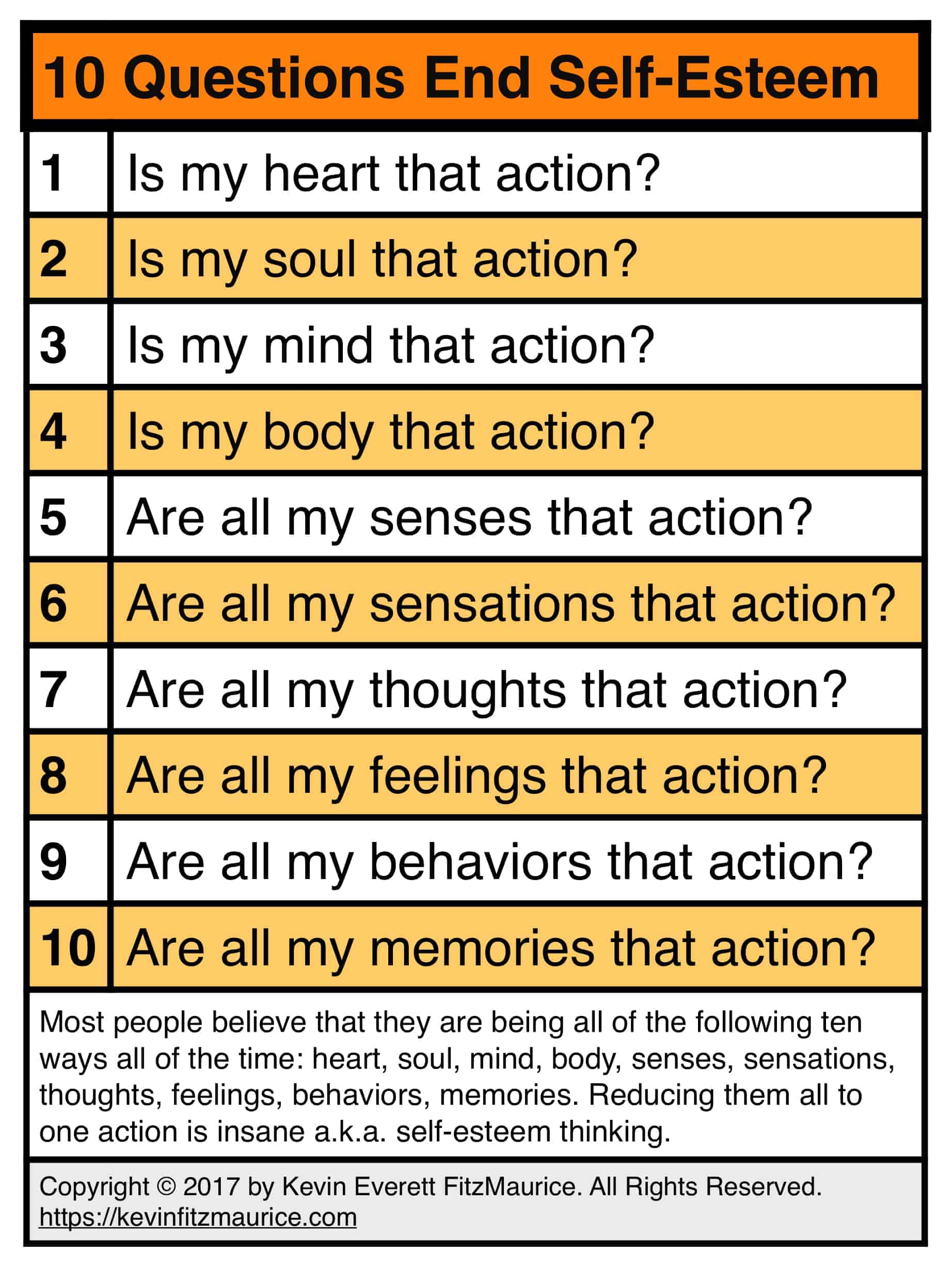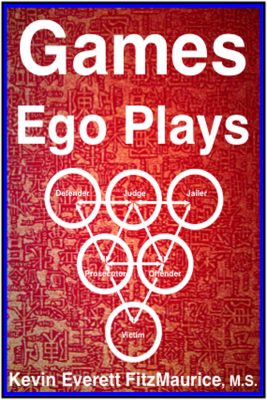4 Kinds of Unconditional Esteem
- Ego will help you to recognize, remove, and replace your ego: a.k.a. self-esteem.
“It is the part of an uneducated person to blame others where he himself fares ill; to blame himself is the part of one whose education has begun; to blame neither another nor his own self is the part of one whose education is already complete.” —Epictetus, Enchiridion
“Unconditional Self-Accepting means you refuse to give your self, your personality, your being—any global rating.” —Albert Ellis
“REBT helps people gain unconditional self-acceptance and to believe that they are okay or are good just because they exist and had better be taught to all children in the course of their schooling, from early childhood onward.” —Albert Ellis
“The curious paradox is that when I accept myself just as I am, then I can change.” —Carl Rogers
- Read to master the life skill of acceptance using the best combination of CBT, REBT, & Stoicism.
4 Keys to Effective Counseling: USE, UOE, ULE, UAE
- REBT has three main philosophical principles: USA, UOA, ULA.
- REBT’s 3 Main Principles
“To help people achieve the three basic REBT philosophies of unconditional self-acceptance, unconditional other-acceptance, and unconditional life-acceptance, cognitive, emotional, and behavioral methods, which are described in this monograph, are used.” ―Albert Ellis, Rational Emotive Behavior Therapy
Kevin recommends 4: USE, UOE, ULE, UAE
- USE is unconditional self-esteem.
- UOE is unconditional other-esteem.
- ULE is unconditional life-esteem.
- UAT is unconditional ability-esteem.
- Use the system that works for you.
10 Questions Expose Self-Esteem
- Information on the 10 questions.
- Read to master the life skill of acceptance using the best combination of CBT, REBT, & Stoicism.
USE: Unconditional Self-Esteem
- It is opposite to conditional self-esteem (CSE).
Compare CSE & USE
- With unconditional self-esteem, you esteem your being unconditionally no matter what you do or experience.
- With conditional self-esteem, you esteem your self based on what you know, do, have, and/or experience.
- USE relates to REBT’s USA, unconditional self-acceptance.
- It differs from USA in that USA is neutral whereas USE is positive.
Self-Acceptance Is Key
“Unconditional Self-Acceptance (USA) instead of Conditional Self-Esteem (CSE). You rate and evaluate your thoughts, feelings, and actions in relation to your main Goals of remaining alive and reasonably happy to see whether they aid these Goals. When they aid them, you rate that as ‘good’ or ‘effective,’ and when they sabotage your Goals you rate that as ‘bad’ or ‘ineffective.’ But you always—yes, always—accept and respect yourself, your personhood, your being, whether or not you perform well and whether or not other people approve of you and your behaviors.” ―Albert Ellis, How To Stubbornly Refuse To Make Yourself Miserable About Anything – Yes, Anything!
- Read to master the life skill of acceptance using the best combination of CBT, REBT, & Stoicism.
UOE: Unconditional Other-Esteem
- It is opposite to conditional other-esteem (COE).
Compare COE & UOE
- With unconditional other-esteem, you esteem another’s being unconditionally no matter what they do or experience.
- With conditional other-esteem, you esteem another’s self based on what they know, do, have, and/or experience.
- This relates to REBT’s UOA, unconditional other acceptance. It differs from UOA in that UOA is neutral whereas UOE is positive.
- Read to master the life skill of acceptance using the best combination of CBT, REBT, & Stoicism.
ULE: Unconditional Life-Esteem
“Of course there is no formula for success except, perhaps, an unconditional acceptance of life and what it brings.” —Arthur Rubinstein
- It is opposite to conditional life-esteem (CLE).
Compare CLE & ULE
- With unconditional life-esteem, you esteem life unconditionally no matter what life is.
- With conditional life-esteem, you esteem life based on what life does or does not do for you and/or others.
- This relates to REBT’s concept of choosing to prefer differences instead of choosing to awfulize about situations.
- It differs from REBT theory in that ULE teaches positive attitudes regarding life no matter what life brings.
- Life as a whole is unconditionally regarded positively.
- Read to master the life skill of acceptance using the best combination of CBT, REBT, & Stoicism.
UAE: Unconditional Ability-Esteem
- It is opposite to conditional ability-esteem (CAE).
Compare CAE & UAE
- With unconditional ability-esteem, you esteem your abilities unconditionally no matter if you fail or succeed.
- With conditional ability-esteem, you esteem your ability based on whether you succeed or fail.
- This relates to REBT’s concept of HFT, high frustration tolerance.
- It differs from REBT’s HFT in that the focus of UAE is on accepting your abilities rather than on accepting life’s frustrations.
- UAE is related to Albert Bandura’s concept of self-efficacy.
- Read to master the life skill of acceptance using the best combination of CBT, REBT, & Stoicism.
Ellis on Unconditional Self-Acceptance (USA)
- “Accept rather than rate the so-called self and strive for enjoyment rather than the justification of existence.” —Albert Ellis
- “Although the philosophy of REBT is at variance with devout religiosity, in one respect Christian philosophy has been most influential. REBT’s theory of human value (which will be discussed later) is similar to the Christian viewpoint of condemning the sin but forgiving the sinner (Ellis, 191b, 1991c, 1994c; Hauck, 1991; Mills, 1991; Powell, 1976).” —Albert Ellis and Windy Dryden, The Practice of Rational Emotive Behavior Therapy, Second Edition
- “As ever, we use the Christian and REBT philosophy of accepting the sinner but not the sin.” ―Albert Ellis and Robert A. Harper, A Guide to Rational Living, Third Edition, p. 230
- “Conformism, which is one of the worst products of self-rating, generally means conformity to the time-honored and justice-dishonoring rules of the Establishment.” —Albert Ellis
- “Evaluation of an individual tends to bolster the Establishment and to block social change. Since most societies are run by a limited number of ‘upper-level’ people who have a strong, vested interest in keeping them the way they are, self-evaluation usually encourages the individual to go along with social rules, no matter how arbitrary or foolish they are, and especially to woo the approval of the powers-that-be.” —Albert Ellis
- “I can rate my traits, deeds, acts, and performances for the purpose of surviving and enjoying my life more, and not for the purpose of ‘proving myself’ or being ‘egoistic’ or showing that I have a “better” or “greater” value than others.” —Albert Ellis
- “If you do not measure your self-hood, you tend to spend your days asking yourself, ‘Now what would I really like to do, in my relatively brief span of existence, to gain maximum satisfaction and minimum pain?’ If you do measure your self-hood, you tend to keep asking, ‘What do I have to do to prove that I am a worthwhile person?’” —Albert Ellis
- “If you would stop, really stop, damning yourself, others, and unkind conditions, you would find it almost impossible to upset yourself emotionally – about anything. Yes, anything.” —Albert Ellis
- “No, we cannot accurately say that some people are essentially evil. Even those who commit many immoral acts would have to do so all the time to be evil people. As Alfred Korzybski wrote in 1933, calling anyone an evil person is to falsely overgeneralize and to completely damn her or him for some evil acts. Invariably, the Hitlers and the Ted Bundys of the world, who steadily commit some of the worst crimes, also do a number of good and kind deeds. And some “bad people,” like St. Augustine when young, later achieve sainthood. Humans are fallible—and changeable.” —Albert Ellis
- “Once you damn an individual, including yourself, for having or lacking any trait whatever, you become authoritarian or fascistic; for fascism is the very essence of people-evaluation.” —Albert Ellis
- “People’s intrinsic value or worth cannot really be measured accurately because they’re including their becoming. They are a process with an ever-changing present and future.” —Albert Ellis
- “REBT does not say that these three major philosophic acceptances [unconditional self-acceptance, unconditional other-acceptance, unconditional life-acceptance] will make you incredibly happy. They won’t. You’ll still have your and your social group’s limitations. You’ll still have the ability—the talent!—to needlessly upset yourself by making your healthy desires into unhealthy demands. You’ll still have physical problems to afflict you—such as floods, hurricanes, and disease. But your emotional-thinking-behaving problems will most probably be reduced—and so will your disturbed feelings about your thoughts, emotions, and actions.” —Albert Ellis, How to Stubbornly Refuse to Make Yourself Miserable About Anything—Yes, Anything!
- “REBT helps people gain unconditional self-acceptance and to believe that they are okay or are good just because they exist had better be taught to all children in the course of their schooling, from early childhood onward.” —Albert Ellis
- “Remember there are no heroes or heroines, any great people. These are fiction, myths which we fallible humans seem determined to believe in order to ignore the fact that we presently are, and probably will always be, highly inefficient, mistake-making animals.” —Albert Ellis
- “Self-esteem is the greatest sickness known to man or woman because it’s conditional.” —Albert Ellis
- “Stop damning yourself and others by fully accepting the view that wrong, unethical, and foolish acts never can make you or them into bad or rotten people.” —Albert Ellis
- “The greatest sickness known to man or woman is called self-esteem. If you have self-esteem, then you’re sick, sick, sick, because you say: I’m okay because I do well and because people love me, so when I do poorly, which I’m a fallible human and will, and people hate me because they may jealously hate me or they just don’t like me, then back to shithood I go.” —Albert Ellis
- “This is the essence of intellectual fascism: it is a belief about humans which convinces not only the believers, but usually their victims as well, that people acquire intrinsic worth not from merely being, but from being intelligent, talented, competent, or achieving. It is politico-social fascism with the trait names changed—the same hearse with different license plates.” —Albert Ellis
- “Unconditional Self-Acceptance (USA) instead of Conditional Self-Esteem (CSE). You rate and evaluate your thoughts, feelings, and actions in relation to your main Goals of remaining alive and reasonably happy to see whether they aid these Goals. When they aid them, you rate that as ‘good’ or ‘effective,’ and when they sabotage your Goals you rate that as ‘bad’ or ‘ineffective.’ But you always—yes, always—accept and respect yourself, your personhood, your being, whether or not you perform well and whether or not other people approve of you and your behaviors.” ―Albert Ellis, How To Stubbornly Refuse To Make Yourself Miserable About Anything – Yes, Anything!
- “Unconditional self-acceptance is the basic antidote to much of your depressed self-downing feelings. Self-appraisal almost inevitably leads to one-upmanship and one-downmanship. If you rate yourself as being ‘good,’ you will usually rate others as being ‘bad’ or ‘less good.’ If you rate yourself as being ‘bad,’ others will be seen as ‘less bad’ or ‘good.’ Thereby you practically force yourself to compete with others in ‘goodness’ or ‘badness’ and constantly feel envious, jealous, or superior. Persistent individual, group, and international conflicts easily stem from this kind of thinking and feeling.” —Albert Ellis
- “Unconditional Self-Accepting means you refuse to give your self, your personality, your being—any global rating.” —Albert Ellis
- “You accept all humans because they’re human. You don’t like what they do and you stay away from some of them and you put some of them in jail if they act immorally, but still fully accept them as persons.” —Albert Ellis
- “You’re never a good person. Because if you do a good deed—save a child, for example, from drowning at the risk of your own life—that’s a good deed. But ten minutes later you might kill somebody, or steal, or lie. So you’re a person who does good, valuable, self-helping, and bad, unfortunate, self-defeating things.” —Albert Ellis
- Read to master the life skill of acceptance using the best combination of CBT, REBT, & Stoicism.
Quotations Various Sources
Listed Alphabetically
“As ever, we use the Christian and REBT philosophy of accepting the sinner but not the sin.” ―Albert Ellis and Robert A. Harper, A Guide to Rational Living, Third Edition, p. 230
“Condemn the sin, not the sinner.” ―Christian saying
“Conditional love is not love but reciprocity.” —Kevin Everett FitzMaurice
“Despise the crime, not the criminal.” ―Japanese saying
“Flow with whatever may happen and let your mind be free. Stay centered by accepting whatever you are doing.” ―Zhuangzi (Zhuang Zhou, Chuang Tzu)
“Have patience with all things but first with yourself. Never confuse your mistakes with your value as a human being. You are perfectly valuable, creative, worthwhile person simply because you exist. And no amount of triumphs or tribulations can ever change that.” —Saint Frances de Sales
“I suggest that people take the challenge and adventure of creating and maintaining a profound attitude of unconditionally accepting themselves, other people, and world frustrations, no matter what occurs in life. They better make it an integral, unforgettable part of their living.” —Albert Ellis
“If value is potential, then all humans are always good for all humans always have the potential for good.” ―Kevin Everett FitzMaurice
“If you are reading this in a room, take a look around you and try to give the room one global rating that completely accounts for it in all its complexity. You can’t do it, can you? Why not? Because the room is too complex to be given a single rating. So if you can’t rate a room, how can you rate a human being who, after all, is far more complex than a room. The answer is that you can’t.” —Windy Dryden
“Of course there is no formula for success except, perhaps, an unconditional acceptance of life and what it brings.” ―Arthur Rubinstein
“Self-esteem is the greatest sickness known to man or woman because it’s conditional.” ―Albert Ellis
“Self-esteem steals souls.” —Kevin Everett FitzMaurice
“The attitude of unconditional self-acceptance is probably the most important variable in their long-term recovery.” ―Albert Ellis, Rational-Emotive Therapy with Alcoholics and Substance Abusers, p. 71
“The cause of all sins in every case lies in the person’s excessive love of self.” ―Plato, Laws
“The main emotional support that you can give yourself is what we have mentioned several times already in this book–achieving unconditional self-acceptance (USA).” ―Albert Ellis and Robert A. Harper, A Guide to Rational Living, Third Edition, p. 230
“To help people achieve the three basic REBT philosophies of unconditional self-acceptance, unconditional other-acceptance, and unconditional life-acceptance, cognitive, emotional, and behavioral methods, which are described in this monograph, are used.” ―Albert Ellis, Rational Emotive Behavior Therapy
“Unconditional self-acceptance is the basic antidote to much of your depressed self-downing feelings.” –Albert Ellis
“Unconditional self-acceptance is the basic antidote to much of your depressed self-downing feelings. Self-appraisal almost inevitably leads to one-upmanship and one-downmanship. If you rate yourself as being ‘good,’ you will usually rate others as being ‘bad’ or ‘less good.’ If you rate yourself as being ‘bad,’ others will be seen as ‘less bad’ or ‘good.’ Thereby you practically force yourself to compete with others in ‘goodness’ or ‘badness’ and constantly feel envious, jealous, or superior. Persistent individual, group, and international conflicts easily stem from this kind of thinking and feeling.” —Albert Ellis
“Unconditional Self-Accepting means you refuse to give your self, your personality, your being—any global rating.” ―Albert Ellis
“You wouldn’t worry about what others think of you if you realized how seldom they do.” ―Eleanor Roosevelt
- Read to master the life skill of acceptance using the best combination of CBT, REBT, & Stoicism.
Related Pages of Free Information
- 8 Counseling Issues to Focus On
- Coping Skills: Free Help
- Counseling Issues: Free Help
- Ego & Self-Esteem Fast-Facts
- Emotional Responsibility: List Pages
- Exercises & Techniques: List Pages
- REBT (Rational Emotive Behavior Therapy): List Pages
- REBT’s 3 Main Principles
- Unconditional Self-Acceptance by Albert Ellis: YouTube External Link (Audio Only)
- (USE), (UOE), (ULE) & (UAE): Examples
- (USE), (UOE), (ULE) & (UAE): Reasons
- Read and discover the best journaling system to reduce and remove your ego.
- Read to master the life skill of acceptance using the best combination of CBT, REBT, & Stoicism.
6 Groups of Topics Menu
- 1. Pages by Topic
- 2. Fast-Facts by Topic
- 3. Quotations by Topic
- 4. Poems by Topic
- 5. Scripture by Topic
- 6. Websites by Topic
- Read to master the life skill of acceptance using the best combination of CBT, REBT, & Stoicism.
- Read and discover the best diagrams and maps of how people play games with your mind and heart.
9 Skills & Topics Menu
- 1. Anger Skills & Topics
- 2. Blame Skills & Topics
- 3. Communication Skills & Topics
- 4. Coping Skills & Topics
- 5. Counseling Skills & Topics
- 6. Praying Skills & Topics
- 7. Recovery Skills & Topics
- 8. Responsibility Skills & Topics
- 9. Thinking Skills & Topics
- Read to master the life skill of acceptance using the best combination of CBT, REBT, & Stoicism.
- Read and discover the best diagrams and maps of how people play games with your mind and heart.




